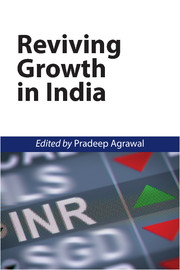Book contents
- Frontmatter
- Contents
- List of Tables and Figures
- Preface
- Section 1 The importance of growth
- Section 2 Reviving growth of industry and exports
- Section 3 The dampeners to growth: Controlling inflation
- Section 4 The supply constraints to growth
- Chapter 8 Sustainability of Indian Agriculture
- Chapter 9 Energy Security for India
- Chapter 10 Social and Physical Infrastructure in India: Constraints to Rapid Growth
- Chapter 11 Infrastructure Challenges in India: The Role of Public–Private Partnerships
- Section 5 Emerging issues in growth: The labour and capital markets
- Contributors
- Index
Chapter 9 - Energy Security for India
from Section 4 - The supply constraints to growth
Published online by Cambridge University Press: 18 December 2015
- Frontmatter
- Contents
- List of Tables and Figures
- Preface
- Section 1 The importance of growth
- Section 2 Reviving growth of industry and exports
- Section 3 The dampeners to growth: Controlling inflation
- Section 4 The supply constraints to growth
- Chapter 8 Sustainability of Indian Agriculture
- Chapter 9 Energy Security for India
- Chapter 10 Social and Physical Infrastructure in India: Constraints to Rapid Growth
- Chapter 11 Infrastructure Challenges in India: The Role of Public–Private Partnerships
- Section 5 Emerging issues in growth: The labour and capital markets
- Contributors
- Index
Summary
INTRODUCTION
Energy security is crucial for sustaining high economic growth over long periods. With rapid economic growth, petroleum demand has been rising rapidly in India. Crude oil accounts for about 29 per cent of India's energy consumption (IEA, 2013). As India imports most of its crude oil, and there is no alternative to crude oil derivatives such as petrol and diesel for transportation and many other industrial uses, controlling crude oil consumption is difficult, and any rise in its price puts inflationary pressure on the economy. Thus, estimations of demand for crude oil, diesel and projections of likely future demand should be useful to policy makers in making appropriate supply arrangements.
Due to the global recession, crude oil prices have remained relatively stable over the past few years. The Brent crude oil spot price was US$107.97 per barrel in December 2011 and US$109.64 per barrel in December 2012 (Global Economic Monitor, 2013). But demand in the US and Western Europe (which has been roughly constant for the past several years) could start increasing if the recession ends in a few years. Together with rapidly increasing demand from emerging economies such as China and India, this could raise crude oil prices over the long term, unless there are major new oil finds or major technological breakthroughs in alternative energy sources.
If this assessment holds, the Indian economy's growth path could slow down unless well-planned policy responses are adopted. For example, sharp crude oil price increases in 2007–08 and again in 2010–11 led to episodes of high inflation in India that slowed growth because of the tight monetary policy adopted to fight inflation. Therefore, this study empirically analyses the long term demand relations for crude oil and diesel, for which the demand has been rising most rapidly. We then use the long run elasticities to project demand for these products up to 2025 for several scenarios of Gross Domestic Product (GDP) growth and crude oil prices.
- Type
- Chapter
- Information
- Reviving Growth in India , pp. 220 - 238Publisher: Cambridge University PressPrint publication year: 2015



